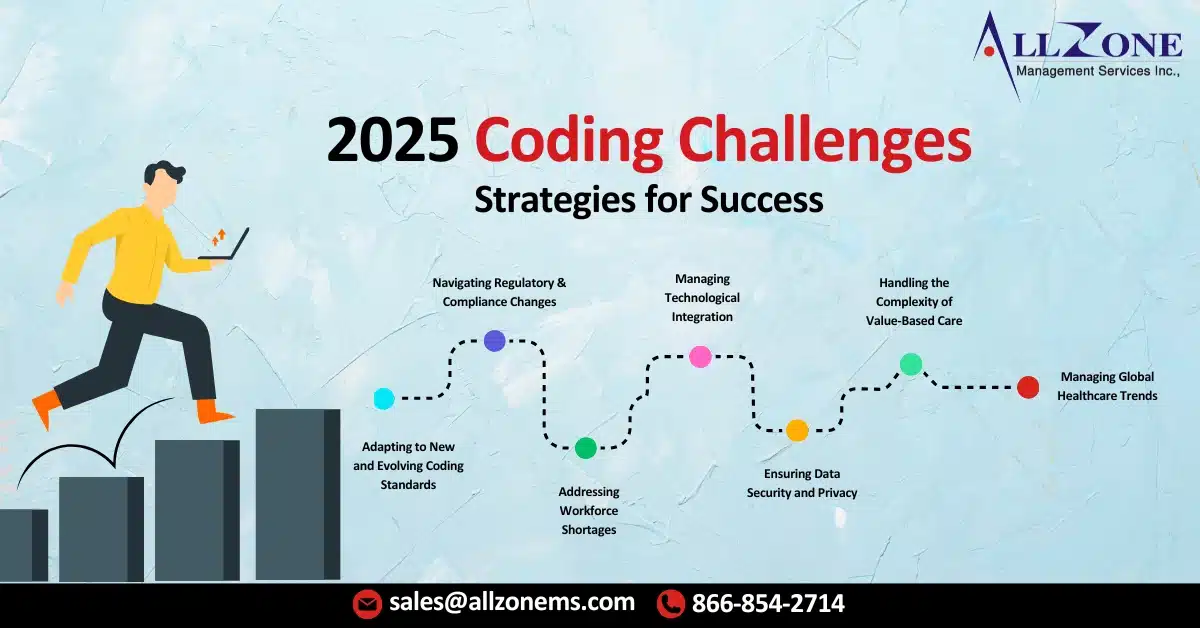It is predicted that the healthcare industry will continue to evolve rapidly as we enter 2025. Medical coding, one of the cornerstones of healthcare administration, faces unique Coding challenges that require innovative strategies to succeed. For organizations to maintain accuracy, compliance, and efficiency, it is imperative to stay current with the changing regulations, technological advances, and increasing complexity of healthcare services. There are several major challenges medical coders and healthcare providers will face in 2025, and this newsletter explores strategies for overcoming them.
Adapting to New and Evolving Coding Standards
Maintaining ICD-11, CPT, and HCPCS coding systems will be one of the biggest coding challenges in 2025. Coders must become familiar with a more granular classification system in order to use ICD-11, which aims to provide more detail and global applicability. Despite the benefits of increased specificity for patient care and data analysis, coding presents a steep learning curve.
Strategies for Success:
- Invest in Continuous Education: To ensure coders stay on top of the latest coding standards, organizations should prioritize ongoing training. Online courses, workshops, and certification updates can help fill knowledge gaps.
- Leverage Technology: ICD-11-integrated software can help coders transition smoothly and reduce errors with AI-driven suggestions.
- Establish Collaborative Learning: Collaborate among coding teams to share insights and best practices, fostering a culture of growth.
Navigating Regulatory and Compliance Changes
To improve patient outcomes, reduce fraud, and enhance healthcare quality, regulatory bodies constantly refine policies. The coder must be aware of changes to Medicare, Medicaid, and other payer requirements by 2025, including new audit protocols and value-based care models.
Strategies for Success:
- Stay Informed: You can stay up-to-date by subscribing to newsletters and attending compliance seminars offered by organizations such as CMS and AMA.
- Implement Robust Auditing Processes: Keep your internal audits up-to-date so that you’re compliant with the latest regulations and that potential discrepancies are identified in advance of external audits.
- Collaborate with Compliance Experts: Provide guidance on navigating complex regulatory landscapes by engaging compliance officers and legal advisors.
Addressing Workforce Shortages
In the coding field, demand for skilled coders is outpacing supply, causing workforce coding challenges. This gap can result in increased workloads, burnout, and decreases in accuracy.
Strategies for Success:
- Enhance Recruitment and Retention: Attract and retain top talent by providing competitive salaries, benefits, and career development opportunities.
- Embrace Remote Work: Increase hiring pools by offering remote work options, which can attract coders from around the world.
- Upskill Current Employees: Training programs can enable existing staff to handle more complex coding tasks by equipping them with advanced skills.
Managing Technological Integration
Artificial intelligence (AI), Natural Language Processing (NLP), and robotic process automation (RPA) are transforming medical coding. While these tools offer immense efficiency potential, their implementation can be challenging.
Strategies for Success:
- Choose Scalable Solutions: Select technology platforms that integrate seamlessly with existing systems and can be adapted to future advancements.
- Train Staff on New Tools: Make sure coders are trained to effectively use AI-powered software, emphasizing its role as an aid instead of a replacement.
- Monitor and Optimize: Continually evaluate the performance of technological tools and adjust them to maximize their effectiveness.
Ensuring Data Security and Privacy
Protecting sensitive patient data has become a top priority due to the increase in cyber threats. Medical coding processes involve handling vast amounts of Protected Health Information (PHI), which makes coders and healthcare organizations prime targets for cyberattacks.
Strategies for Success:
- Implement Robust Cybersecurity Measures: Ensure the security of your data by encrypting it, installing firewalls, and implementing multi-factor authentication.
- Provide Cybersecurity Training: Staff should be educated about how to avoid phishing attacks, data breaches, and how to maintain data integrity.
- Conduct Regular Security Audits: Implement corrective actions after routine assessments have been performed to identify vulnerabilities.
Handling the Complexity of Value-Based Care
Increasingly, value-based care models focus on outcome-based reimbursements. Accurate coding is essential to capturing care complexity and to ensuring appropriate reimbursement.
Strategies for Success:
- Develop Multidisciplinary Teams: Work with clinicians, administrators, and coders to ensure that documentation is thorough and that codes are assigned accurately.
- Invest in Data Analytics: Optimize performance under value-based care metrics by tracking coding trends, identifying gaps, and using analytics.
- Focus on Documentation Improvement: Ensure that clinical documentation is accurate and up-to-date by implementing Clinical Documentation Improvement (CDI) programs.
Managing Global Healthcare Trends
Coders must navigate international coding standards and practices as medical tourism and cross-border healthcare services are growing. Organizations serving diverse populations need to understand the impact of global health trends on coding.
Strategies for Success:
- Foster Cross-Cultural Competency: Coders should be trained to understand cultural and regional nuances in medical documentation and coding.
- Standardize Processes: Establish universal coding protocols that are aligned with international standards while accommodating local variations.
- Utilize Translation Tools: Ensure consistent coding across borders by leveraging technology to translate medical documents accurately.
Preparing for a Successful Future
Medical coding challenges many in 2025, but they will not be insurmountable. Health care organizations can overcome these obstacles and thrive in an ever-changing landscape by adopting proactive strategies, investing in education, and fostering collaboration.
With our expertise in coding, auditing, and revenue cycle management, Allzone Management Solutions helps medical coders and healthcare providers navigate these coding challenges. Embracing the future of medical coding with confidence and success requires expertise in coding, auditing, and revenue cycle management.
Healthcare providers need to stay informed about Healthcare Coding Updates to the Current Procedural Terminology (CPT), International Classification of Diseases (ICD-11), and Healthcare Common Procedure Coding System (HCPCS) in the ever-evolving world of medical coding and billing. To ensure accurate coding and maximize revenue cycles, we must understand these Healthcare Coding Updates as we enter 2025. Understanding these changes impacts reimbursement, compliance, and overall operational efficiency in healthcare practices.
Our newsletter provides a detailed breakdown of the upcoming 2025 updates to CPT, ICD-11, and HCPCS codes, as well as actionable guidance for implementing them.

